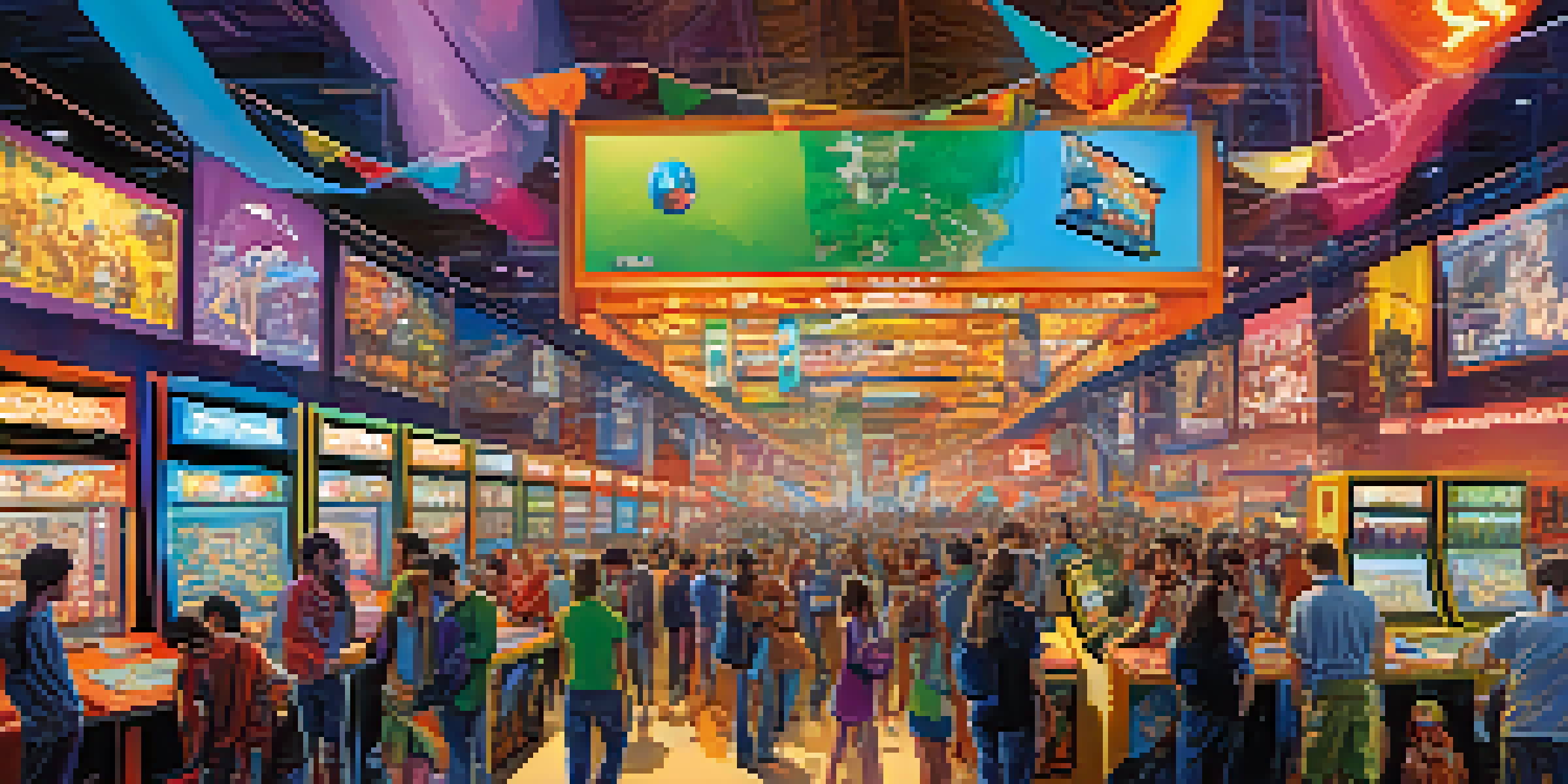The Evolution of Video Game Film Adaptations Over the Years

The Early Days: A Rocky Start for Video Game Films
The first wave of video game film adaptations often struggled to capture the essence of their source material. Movies like 'Super Mario Bros.' in 1993 showcased colorful characters but failed to resonate with fans due to a confusing plot and odd choices. This rocky start set a precedent for skepticism among gamers and filmmakers alike regarding the viability of video game movies.
Video game adaptations have often struggled to capture the essence of their source material, leading to skepticism among both gamers and filmmakers.
Despite the enthusiasm surrounding the gaming industry, the early adaptations often felt rushed, lacking the depth needed to translate interactive experiences into a linear format. It was clear that many films treated their source material more like a cash grab than a beloved franchise. As a result, many fans were left disappointed, leading to a perception that video game films could never succeed.
Yet, these early adaptations laid the groundwork for future filmmakers, highlighting the need for better storytelling, character development, and respect for the original games. In a way, they sparked a conversation about what audiences truly wanted from video game adaptations.
The Rise of Cult Classics and Niche Successes
As the years went by, certain video game adaptations began to carve out their niche, becoming cult classics despite their initial reception. Films like 'Mortal Kombat' (1995) brought a mix of martial arts and fantasy that caught the attention of fans, even if they didn't follow the games closely. These films demonstrated that with the right combination of action and charisma, video game movies could find their footing.

This era also saw the emergence of films that, while not critically acclaimed, resonated well with audiences. Movies like 'Resident Evil' turned into franchise juggernauts, appealing to both gamers and horror enthusiasts alike. Their blend of familiar characters and inventive storytelling kept audiences coming back for more, signaling a shift in how adaptations were being approached.
Rocky Beginnings for Video Game Films
Early adaptations struggled with poor storytelling and fan disappointment, setting a skeptical tone for future projects.
These cult classics proved that there was a market for video game films, provided filmmakers respected the source material while still taking creative liberties. This balance would become crucial for future adaptations, as fans began to demand authenticity.
The 2000s: A Turning Point in Adaptation Quality
The 2000s marked a significant shift in the quality of video game film adaptations, as filmmakers began to take the source material more seriously. With the success of franchises like 'Lara Croft: Tomb Raider,' it became evident that a well-crafted story could elevate a film's reception. This period also saw a greater emphasis on character-driven narratives and intricate plots, drawing fans in with relatable stories.
The future of video game adaptations lies in balancing creativity with fidelity to the source material.
Additionally, advancements in technology allowed filmmakers to create visually stunning adaptations. The 'Final Fantasy' series, particularly 'Final Fantasy VII: Advent Children,' showcased how stunning graphics could enhance storytelling in ways previously unimaginable. This focus on visual fidelity began to attract both gamers and moviegoers, breaking down the barriers between these two audiences.
The 2000s proved that video game films could be more than mere cash grabs; they could offer genuine entertainment and artistic merit. This realization paved the way for the future, encouraging studios to invest more time and resources into creating compelling adaptations.
The Impact of Blockbusters and Franchise Success
As we moved into the 2010s, blockbuster hits like 'The Angry Birds Movie' and 'Warcraft' attempted to tap into the massive gaming audience, often with mixed results. While 'Warcraft' boasted impressive visuals and a richly developed world, it struggled to connect with viewers unfamiliar with the game. This highlighted the ongoing challenge of appealing to both gamers and mainstream audiences.
In contrast, films like 'Detective Pikachu' showcased a successful blend of nostalgia and innovation, drawing in both die-hard fans and newcomers. By incorporating beloved characters and a light-hearted plot, it managed to create a unique cinematic experience that resonated widely. This success encouraged studios to explore more family-friendly adaptations.
Cult Classics Show Adaptation Potential
Films like 'Mortal Kombat' and 'Resident Evil' revealed that with respect for source material, video game movies could find success.
These blockbusters also encouraged studios to focus on franchise potential, leading to sequels and spin-offs that expanded the cinematic universe of video games. The recognition that video game adaptations could yield profitable franchises significantly changed the approach to future projects.
The Role of Streaming Services in Adaptation Trends
With the rise of streaming services, the landscape for video game adaptations began to evolve rapidly. Platforms like Netflix and Amazon Prime started investing in original content based on popular video games, allowing for longer storytelling formats. This shift created opportunities to explore character arcs and intricate plots that traditional films struggled to accommodate.
Series like 'The Witcher' and 'Castlevania' found success by staying true to their source material while also appealing to wider audiences. Their ability to delve deeper into characters and narratives allowed them to create a richer experience, one that resonated with both gamers and newcomers. This trend shows that episodic storytelling can be a game-changer for adaptations.
Streaming services have not only democratized the genre but also encouraged more diverse storytelling approaches. This evolution indicates a promising future for video game adaptations, as they continue to explore new formats and styles.
The Importance of Fan Engagement and Community Feedback
In recent years, fan engagement has become a crucial factor in the development of video game film adaptations. Filmmakers are increasingly turning to fan communities for insights and feedback, understanding that passionate gamers can provide valuable input. This collaboration ensures that adaptations resonate with their intended audience.
Platforms like social media allow fans to voice their opinions, influencing how studios approach projects. For instance, the positive reception of fan-made trailers and concepts has led to a greater emphasis on authenticity in adaptations, making filmmakers more cautious about straying too far from the source material. This shift has empowered fans, making them an integral part of the adaptation process.
Streaming Services Change the Game
The rise of streaming platforms has allowed for deeper storytelling in adaptations, leading to richer experiences for both gamers and new audiences.
As a result, we’re beginning to see adaptations that genuinely respect the source material and its community. This collaborative approach is paving the way for films that not only honor the games but also create a sense of shared experience between creators and fans.
Looking Ahead: The Future of Video Game Film Adaptations
As we look to the future, the evolution of video game film adaptations appears promising. With successful projects like 'The Last of Us' showcasing the potential for deep storytelling and character development, it’s clear that filmmakers are beginning to understand what fans truly want. This adaptation has set a standard for how to handle beloved franchises with care and respect.
Moreover, as gaming continues to grow in popularity, there’s an increasing demand for high-quality adaptations that reflect the complexity of modern games. Audiences are now expecting engaging narratives, rich character arcs, and stunning visuals that mirror the experiences they enjoy in gaming. This expectation is driving studios to invest more in their projects.

Ultimately, the future of video game adaptations lies in balancing creativity with fidelity to the source material. By listening to fans and embracing new storytelling formats, filmmakers have the potential to create adaptations that not only entertain but also enrich the gaming community.